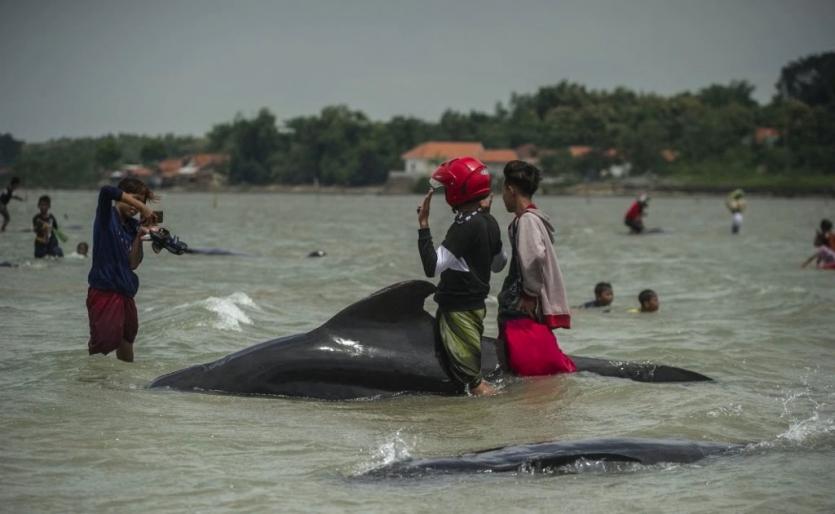Images on Friday showed whales dotted across a wide area with local residents wading in ankle-deep water, some trying to splash water on them or push them out to sea, while others took photos while mounting the stranded animals (Photo source Al Jazeera /AFP)
By Patryk Krych | The World Daily | FEBRUARY 21st 2021
According to the provincial governor, at least forty-six whales had been stranded and subsequently killed on the Indonesian island of Madura. Rescue efforts had been deployed in response, but only three whales were successfully saved and pushed back into the ocean, the governor added.
It was only on Thursday when rescue efforts were put into full effect to help save some of the forty-six whales that had found themselves stranded on the beaches of Madura in Indonesia. Though the efforts were applied fairly early into the stranding, and mainly made up of volunteers willing to help save the marine animals, it would later be announced by regional officials on Friday that only three had been successfully saved as the others perished.
The three saved whales had returned to the ocean, whilst the rest were mourned over, with burial efforts having begun on Saturday in order to waylay the onset of decay and possible sickness. According to officials, however, the rescued whales didn’t leave right away.
“The live whales had to be released together as they live in a group,” said the East Java Governor, Khofifah Indar Parawansa. “But some came back here, trying to find their mothers, though it turns out the mothers are dead.”
Parawansa spoke with reporters, explaining that he had been on the scene of the crisis at the time and that the majority of volunteers first appeared on Thursday. Their efforts seemed successful at first, as they managed to push a few whales back into the ocean, but he explained that many of them had returned.
Excavators were called in on Saturday to assist in the burial of the whales, each of which was between three and five metres long, at a time when the tides would recede. Parawansa further stated that samples from dead whales would be collected and sent over to a regional university for study in the hopes of looking into the cause of the stranding. He added that a full investigation was in order.
“Shortfin pilot whales can be found in warm climates and tropical waters around the world. Generally, they live far from the coast,” said Wiwied Widodo, who was quoted from the Ministry of Environment and Forestry website.






